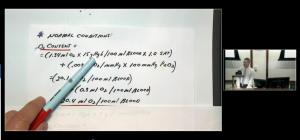Certified Registered Nurse Anesthetists (CRNAs) are the primary providers of anesthesia care in rural America, giving approximately 70 million rural Americans access to anesthesia and serving as the sole providers of anesthesia in about 66 percent of all U.S. rural hospitals. These rural hospitals, however, continue to have difficulty acquiring all of the nurse anesthetists they need to provide the most economical and best access to care.
 With this in mind, the Duke University School of Nursing (DUSON) Nurse Anesthesia Program faculty developed a distance learning component to the program. “The thought was that nurses who were already embedded in and committed to hospitals in rural areas of North Carolina would be able to stay in their community and receive their didactic education by means of video teleconferencing (VTC),” said Charles Vacchiano, PhD, CRNA, FAAN, professor for DUSON.
With this in mind, the Duke University School of Nursing (DUSON) Nurse Anesthesia Program faculty developed a distance learning component to the program. “The thought was that nurses who were already embedded in and committed to hospitals in rural areas of North Carolina would be able to stay in their community and receive their didactic education by means of video teleconferencing (VTC),” said Charles Vacchiano, PhD, CRNA, FAAN, professor for DUSON.
Prior to launching the component at DUSON, Vacchiano worked with a hospital-based nurse anesthesia program in Panama City, Florida, to test the systems and logistics of teaching anesthesia-related course work by VTC. In 2014, the Panama City program joined with Florida State University (FSU) and became the FSU Nurse Anesthesia Program.
In Fall 2016, Vacchiano will build on this idea of teaching students remotely. Through a consortium-style agreement, FSU students will join DUSON students in the N927: Chemistry and Physics for Anesthesia course taught by Vacchiano. This course investigates the principles of chemistry and physics as applied to anesthesia care, operation of equipment and operating room safety.
“The Master of Science in Nurse Anesthesia (MSNA) program at FSU is delighted to count Dr. Vacchiano as a valued member of our instructional staff,” said George Bishop, PhD, associate dean for Florida State University Panama City. “His knowledge, experience and demonstrated excellence in teaching help us provide FSU MSNA students with the very best educational experience available.”
FSU students will be in a classroom in Panama City while Vacchiano and DUSON students are in a classroom at Duke. Vacchiano will be able to view the FSU Panama City class on a monitor in his classroom. Both sets of students will be able to interact and connect with each other in real time.
“The technology in both locations allows students in each classroom to engage with each other and hear questions asked,” Vacchiano said. “If a student in Florida has a question, I’m able to see them raise their hand. In addition, the advanced technology also allows me to move from behind the podium, and the camera is still able to follow me so that the students in Florida do not miss anything.”
 A digital camera in the room serves as a modern-day overhead projector, which allows Vacchiano to show materials to students in his classroom as well as those in Florida. A digital pen also allows Vacchiano to make notes on PowerPoint presentations in real time that students are all able to see. Each class is recorded so students can go back and review that class. Recordings also respond to mobile devices, which allows students to review the class from smart phones and tablets.
A digital camera in the room serves as a modern-day overhead projector, which allows Vacchiano to show materials to students in his classroom as well as those in Florida. A digital pen also allows Vacchiano to make notes on PowerPoint presentations in real time that students are all able to see. Each class is recorded so students can go back and review that class. Recordings also respond to mobile devices, which allows students to review the class from smart phones and tablets.
While Vacchiano is only responsible for course content and materials and FSU is responsible for administration and exam handling, the Florida students will have the same access to Vacchiano as the DUSON students. “As the course director, I will be available to answer questions from the students located in Florida by email,” he said. “The only difference between the students in Florida and the students here in Durham is that FSU will be responsible for testing, evaluating, grading and awarding course credits.”
The benefit of the consortium isn’t just for the FSU MSNA students. The consortium agreement is part of the newly developed Business Development Office at DUSON. A portion of the cost for FSU students to take this Duke class will be used to create nurse anesthetist scholarships for DUSON students.
“With this agreement, FSU is able to offer a class without developing the course, and we’ll be able to hopefully offset some of the cost of a quality education for some of our nurse anesthetist students,” Vacchiano said.
Vacchiano also shared that there are 113 nurse anesthesia programs in the country with the majority being campus-based. He hopes that more programs will consider the consortium-style course to ensure CRNA students have access to the education that will allow them to excel in this field and meet the needs of the population.